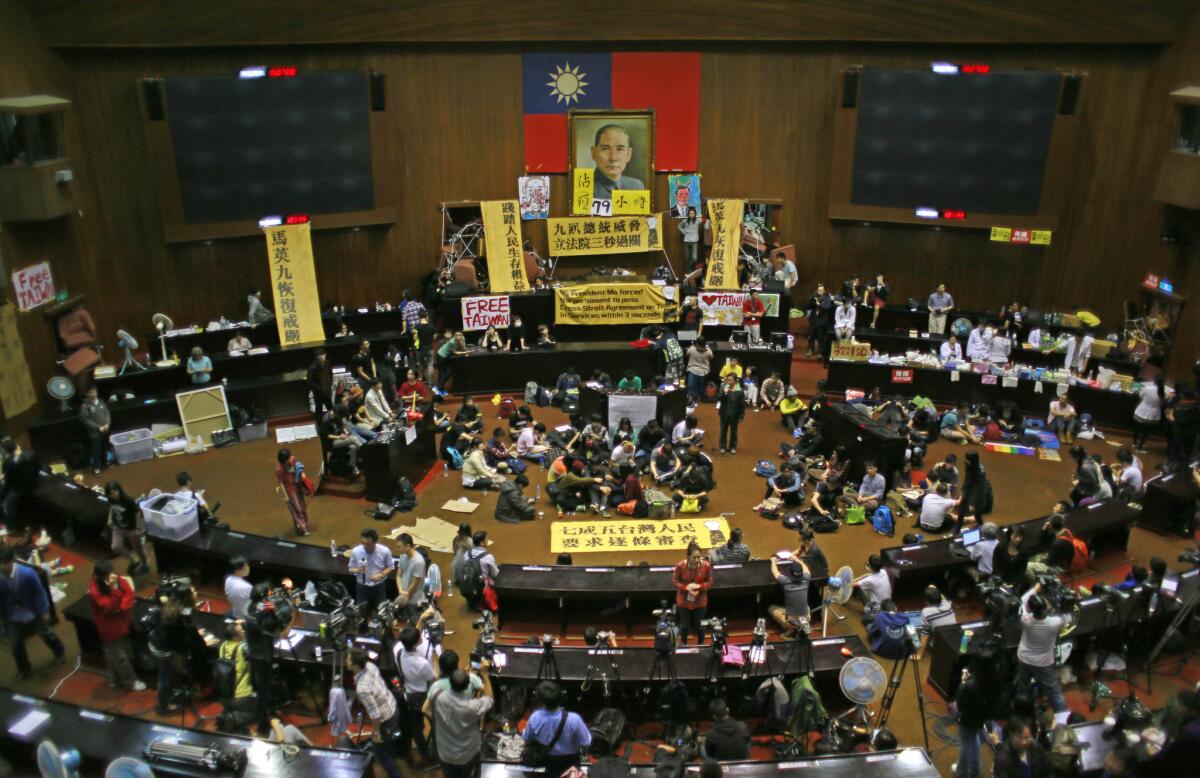Taiwanese students protest trade pact with mainland China

- Share via
TAIPEI, Taiwan -- As students occupied Taiwan’s legislative chamber Sunday for a sixth day to protest a free-trade agreement with China, President Ma Ying-jeou denounced the takeover as a threat to democracy.
Government officials have pledged not to use force to remove the protesters, who fear the agreement will hurt Taiwan’s small businesses and give China too much influence.
[Updated at 3:45 p.m., March 23: While the standoff continued at the legislature, a group broke into the government’s main executive building Sunday night, reaching Premier Jiang Yi-huah’s office. They clashed with police, who eventually cleared the building. About 70 protesters and police officers were treated at nearby hospitals for minor injuries.]
With access to its chamber blocked, the island’s unicameral parliament, known as the Legislative Yuan, has not moved forward to ratify the trade agreement. The accord would open many of Taiwan’s service industries, including banking, printing and even hair dressing, to Chinese investment while providing Taiwanese businesses with similar opportunities in China. Representatives from both governments signed the agreement in June.
Ma addressed the protesters for the first time at a news conference Sunday morning. He said the trade agreement is vital to Taiwan’s economic future and will allow the island to better compete with South Korea, one of the region’s economic powerhouses.
The Legislative Yuan has agreed to a line-item review of the pact, he noted before urging the protesters to disband.
“Is this the sort of democracy we want?” Ma asked. “Must the rule of law be sacrificed in such a manner? Do we not take pride in our democracy and our respect for rule of law?”
In response, student leader Lin Fei-fan read a statement calling on the government to withdraw from the trade agreement and criticizing the approval process as undemocratic.
“If the people don’t have oversight over the government, that’s fake democracy and genuine dictatorship,” said Lin, a graduate student at National Taiwan University.
Hundreds of protesters who have slept in and around the legislature since Tuesday night have survived mostly on food and bottled water donated by supporters.
The chamber where the legislature normally meets has become a headquarters for the student movement, with “Free Taiwan” and other slogans draped around a portrait of Sun Yat-sen, the revolutionary who overthrew the Manchu dynasty and established the Chinese republic.
Wang Dan and Wuer Kaixi, leaders from the 1989 Tiananmen Square protests in Beijing, have visited to show support for the students.
China, which considers Taiwan a renegade province, remains under authoritarian rule while Taiwan is a democracy. The two sides have extensive business ties and have grown closer during Ma’s administration.
Alan Romberg, a Taiwan expert at the Washington-based Stimson Center, said the Taiwanese government needs to salvage the trade deal or its credibility will be damaged. But any deal with China is controversial, and Ma is deeply unpopular among supporters of the opposition Democratic Progressive Party.
“Clearly, the concerns about this bill are greatly heightened because the counterpart is the PRC [People’s Republic of China], and there is a general worry about the implications of becoming more dependent on mainland markets and mainland intrusions into Taiwan markets,” Romberg said in an email.
In a potent symbol, a Taiwanese flag flew upside down atop the Legislative Yuan building on Sunday. Protesters patrolled the roof as police officers guarded the entrances. Office workers and grandmothers, as well as students, milled in the surrounding streets listening to speeches by activists opposing the trade agreement. Some voiced fears that Taiwan would become a “second Hong Kong” or be claimed by China as Crimea has been by Russia.
Chuang Yen, a college student from Kaohsiung in southern Taiwan, has been sleeping outside on cardboard boxes for three days without a shower.
The trade agreement “has a lot of political implications,” Chuang said. “The publishing industry can be influenced by the Chinese. This would be a limitation on our freedom of speech.”
Jenson Yeh, 33, a salesman from Taichung, said he would sacrifice some economic growth to preserve freedom of speech.
“I can imagine that the Chinese would use government investment to penetrate Taiwan to a certain degree. Then they would have power over Taiwanese society,” Yeh said. “They wouldn’t need to use force – it would be de facto unification.”
In the Taipei suburb of Yung Ho, Hong Long said his hair salon will not be affected if Chinese investors enter the market. Prices are already low, and pumping money into a salon won’t make the stylists more fashion-forward, he said.
“They may have investment money, but as far as technique, ours is better,” Hong said. “Taiwanese customers won’t want to use stylists from China.”
[For the record, 10:24 p.m. March 23: An earlier version of this post said that in the legislative chamber, slogans were draped around a portrait of Chiang Kai-shek, whose Nationalist forces retreated to Taiwan after being defeated on the mainland by the Communists in 1949. The portrait is of the revolutionary Sun Yat-sen.]
Twitter: @cindychangLA
More to Read
Sign up for Essential California
The most important California stories and recommendations in your inbox every morning.
You may occasionally receive promotional content from the Los Angeles Times.













